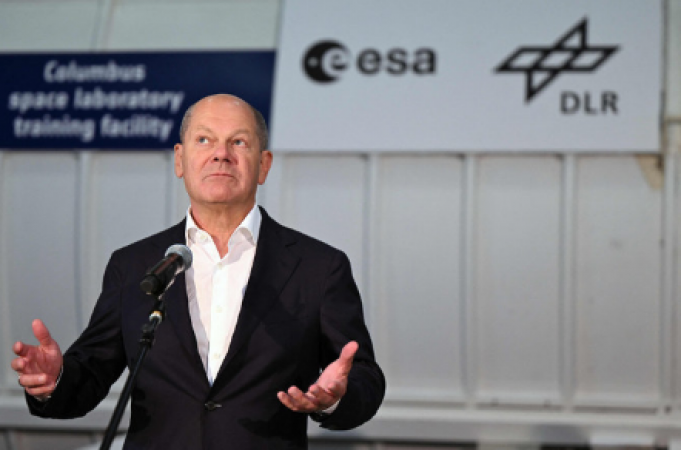
Berlin: Germany's energy future, Chancellor Olaf Scholz has firmly voiced his opposition to the construction of a new nuclear power plant in the country. Scholz's comments, made during an interview with the newspaper Frankfurter Allgemeine Zeitung on a Saturday, underline his conviction that nuclear power is not the right path for meeting Germany's energy needs. Instead, he advocates for a stronger focus on renewable energy sources such as solar and wind power as the way forward.
"We need to invest more in renewable energies," Chancellor Scholz stated emphatically. "That is the way to go."
Scholz's declaration comes at a critical juncture for Germany's energy security, given the ongoing conflict in Ukraine following Russia's invasion. Russia has historically been a key supplier of natural gas to Germany, and the war has raised legitimate concerns about the stability and security of these energy supplies.
Also Read: Remembering Sidharth Shukla: Two Years Since the Loss of a Rising Star
Some German politicians have argued that the country should consider building new nuclear power plants as a means of reducing its dependence on Russian gas. However, Scholz, in his recent statement, firmly asserts his belief that nuclear power is not the solution Germany should pursue.
"Nuclear power is not a solution for the future," Scholz affirmed. "It is a dead end."
Scholz's position has garnered support from environmental groups, which have long campaigned against the development of new nuclear power facilities in Germany.
"This is a welcome decision," declared Patrick Graichen, an energy expert from Greenpeace Germany. "Nuclear power is not a viable response to the pressing climate crisis."
Furthermore, Scholz's stance aligns with the ongoing discussions within the European Commission, which is contemplating the labeling of nuclear power as a sustainable investment. This proposal has faced resistance from certain countries, including France and Finland, both of which advocate for nuclear power as a viable energy source.
The implications of Scholz's decision to oppose new nuclear power plant construction on Germany's energy security remain to be seen. However, the Chancellor's unwavering commitment to renewable energy signifies Germany's determination to transition towards a more sustainable and environmentally friendly energy landscape.
Also Read: Exploring the World of National Flowers and Flags
Germany, renowned for its robust economy and technological advancements, has long been a leader in renewable energy adoption within Europe. With its ambitious energy transition policy, known as the "Energiewende," the nation has been actively working towards reducing its carbon footprint and increasing its reliance on clean energy sources. Chancellor Scholz's recent remarks serve as a reaffirmation of Germany's dedication to this path.
At the heart of this debate is the question of how to secure Germany's energy future while simultaneously addressing the environmental and geopolitical challenges that have arisen in recent times. Russia's involvement in the Ukrainian conflict has put a spotlight on the vulnerabilities of energy supply chains, making energy diversification and security a pressing concern for the German government.
The argument in favor of nuclear power centers on its capacity to provide a stable and consistent energy supply, reducing Germany's dependence on external sources, particularly Russian natural gas. However, Chancellor Scholz firmly rejects this approach, stating that nuclear power presents more problems than solutions for Germany's energy future.
Scholz's stance reflects a broader global conversation surrounding the role of nuclear energy in combating climate change and ensuring energy security. While nuclear power can generate significant electricity output with low greenhouse gas emissions, it comes with concerns related to nuclear waste disposal, safety, and the risk of accidents.
The announcement also underscores the Chancellor's alignment with the growing movement for renewable energy. Solar and wind power, in particular, have gained traction as viable and sustainable energy sources. Germany's investment in these technologies has already borne fruit, making it a leader in the global shift toward clean energy.
The decision to oppose new nuclear power plants undoubtedly carries both benefits and challenges. On one hand, it solidifies Germany's commitment to combating climate change and promoting renewable energy solutions. On the other, it raises questions about the nation's ability to ensure energy security in the face of geopolitical uncertainties.
Germany's energy landscape is inextricably linked to its economic stability and global influence. As such, any shift in energy policy, such as Scholz's rejection of new nuclear power, has far-reaching consequences. It remains to be seen how this decision will impact Germany's energy security, its climate goals, and its position on the global stage.
In conclusion, Chancellor Olaf Scholz's decision to oppose the construction of a new nuclear power plant in Germany reflects a clear commitment to prioritizing renewable energy sources, such as solar and wind power. This stance comes at a crucial time when energy security concerns are heightened due to the ongoing conflict in Ukraine and Germany's reliance on Russian natural gas.
Also Read: Concerns Raised Over Broadness of TRAI's OTT Regulation Consultation Paper
Scholz's position aligns with Germany's long-standing commitment to transitioning toward a more sustainable and environmentally friendly energy landscape, further solidifying its leadership in the global shift toward clean energy.
However, the decision raises questions about Germany's ability to ensure energy security amidst geopolitical uncertainties. The path forward for Germany's energy policy will undoubtedly continue to be a topic of intense debate and scrutiny on both domestic and international fronts.